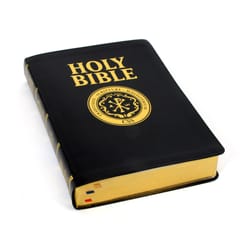Skip to comments.
The Pilgrims' Regress - The Geneva Bible And The "Apocrypha"
Hands on Apologetics ^
| Gary Michuta
Posted on 03/25/2012 2:40:30 AM PDT by GonzoII
|
|
|
Every American schoolchild knows that the pilgrims landed on Plymouth rock, but do they know which Bible the pilgrims used? Most people, if asked the question, would say the Puritans used the good old King James Version. Wrong. The King James Bible was the "Authorized Version" of the Established Church of England and the Puritans were religious dissenters from that church. The Puritan's Bible of choice was the Geneva Bible, which was translated by Protestants who fled to Geneva from England during the reign of Queen Mary.
|
The Geneva Bible broke new ground for printed Bibles. It was the first Bible to assign chapter and verses to the text and its copious marginal notes qualify it to be called the first study Bible. The marginal notes were from a Reformed perspective and the Geneva Bible (1599) is still revered by many Reformed Protestants today. Like nearly all early Protestant Bibles, the Geneva Bible contained the Deuterocanon gathered together into an appendix between the Old and New Testaments titled "Apocrypha" (Right - the 1599 Geneva Bible's table of contents). By "Apocrypha," the early Reformers meant those books that are good and beneficial for Christians to read, but not for the |
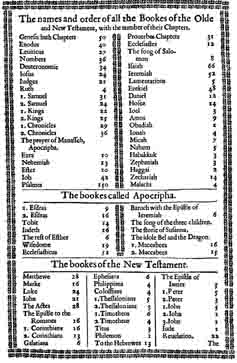
|
purpose of confirming doctrine. The Geneva Bible also sported (like the early editions of its authorized counterpart) cross references to the "Apocrypha" in the New Testament. The importance of these cross references should not be minimized; they demonstrate that the early editors believed that the "Apocrypha" played in integral role in the New Testament text and that the cross referenced texts aided the Protestant reader in understanding and interpreting the New Testament. As time moved on, these benefits were overshadowed by anti-Catholic prejudice and the desire to minimize the books that the Catholic Church reaffirmed as inspired Scripture. The cross references slowly started to disappear from margins of the King James Version and the Geneva Bible until all of them, and the "Apocrypha" itself had totally disappeared. The following are examples of the more interesting "Apocrypha" cross references that were omitted (suppressed?) in later editions.
|
Geneva 1560 - Matthew 27:34 / Wisdom 2:18 |
Geneva 1599 - Wisdom Omitted |
 |
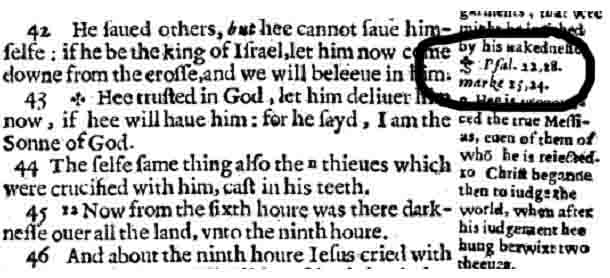 |
The 1560 edition of the Geneva Bible listed two cross-references for Matthew 27:43, namely Psalm 22:9 and Wisdom 2:18. Unlike Psalm 22:9, only Wisdom 2:18 links God's promise to rescue the Just One's claim to be the Son of God. However, the 1599 edition of the same Bible retains only Psalm 22:9 replacing Wisdom 2:18 with a cross reference to the Gospel of Mark.
|
Geneva 1560 - James 3:2 |
Geneva 1599 - Omitted |
|

|
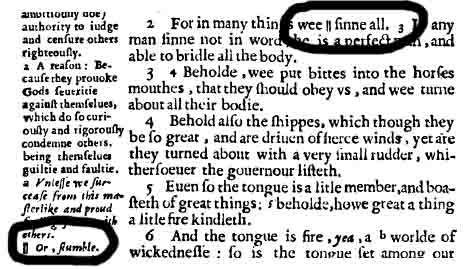
|
The 1560 edition gives James 3:2 three consecutive cross references to the Book of Sirach (Sir. 14:1, 19:16, and 25:11). There is nothing earthshaking regarding these cross references. Still, its interesting that the editors of the 1560 edition saw multiple contacts with Sirach while the editors of the 1599 entirely omits all three.
|
Geneva 1560 - Hebrews 1:3 |
Geneva 1599 - Omitted |
|

|
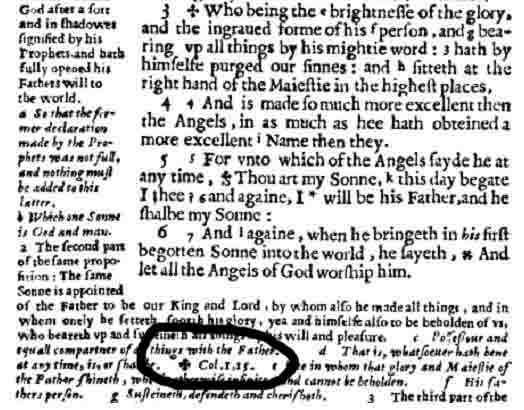
|
The 1560 edition provides an important cross reference from Hebrews 1:3 to Wisdom 7:26. Hebrews speaks of Jesus as the "refulgence" (Geneva Bible "brightness") of God's glory. The Greek word "Apaugasma" is used only in Hebrews 1:3 and Wisdom 7:26 in the Greek Bible. Moreover, the context of Wisdom's description of Wisdom personified sheds much light (pun intended) on who Jesus is. Unfortunately, the readers of the later 1599 edition were left in the dark as to this connection.
|
Geneva 1560 - Hebrews 11:35 - Omitted |
Geneva 1599 - Reference Added |
|
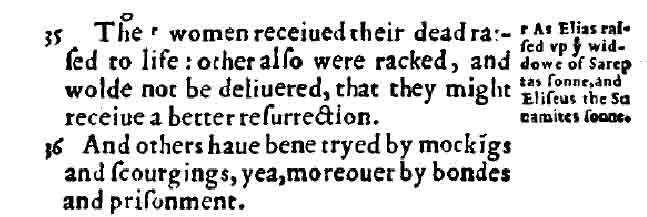
|
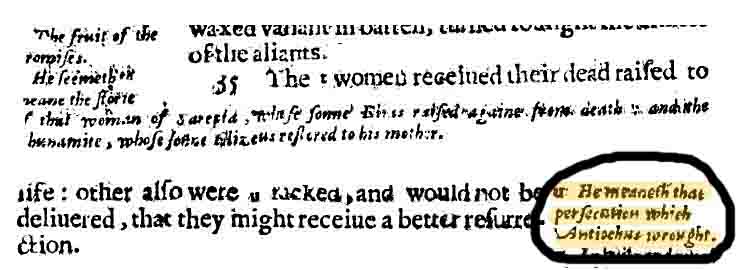
|
The Geneva 1560 edition oddly omits a cross reference to 2 Maccabees 7:1-42 in Hebrews 11:35 even though the connection between these two texts is beyond doubt. Not only is Second Maccabees 7:1-42 the only place in the Greek Bible where people suffered torture and death explicitly for their hope in the resurrection (2 Macc. 7:9, 11, 14, 23, 29), but Hebrews 11:35-36 describes their suffering using the same words as Second Maccabees (tympanizo and empaigmos). The 1599 edition remedied this earlier defect, not by cross referencing 2 Maccabees 7:1-42, but by inserting the cryptic statement, "He [the writer of Hebrews] means that perfection which Antiochus wrought." In my book, Why Catholic Bibles Are Bigger: The Untold Story of the Lost Books of the Protestant Bible (Grotto Press, 2007), I chronicle the demise of the "Apocrypha" in Protestant Bibles. And frankly it was one of the most difficult sections of my book to write since I could see how so many Protestants today have been unknowingly robbed of their Protestant heritage because later editors were embarrassed by the beliefs of the predecessors. It seemed clear to me then (as it does now) that these omissions were not the result of overcrowded margins. They were removed for another purpose. As the Protestant theologian William Daubney explains, "Plainly, the references to the Apocrypha told an inconvenient tale of the use which the Church intended should be made of it; so... these references disappeared from the margins" (The Use of the Apocrypha In the Christian Church (London: Clay and Sons, 1900), 21). Hence we see the Pilgrims' regress from the historic form of the Protestant Bible. Not only that, but even more importantly, we see an even further departure from the form of the historic and ancient Christian Bibles, which always included the Deuterocanon interdispersed within the Old Testament corpus.
|
TOPICS: Catholic; Charismatic Christian; Evangelical Christian; History; Mainline Protestant; Orthodox Christian
KEYWORDS: apocrypha; catholic; deuterocanonicals; genevabible
Navigation: use the links below to view more comments.
first previous 1-20, 21-40, 41-43 next last
To: Mrs. Don-o
The Jewish leadership only rejected them based on the fact that they so strongly facilitated Christian beliefs such as eternal life No, long before the christian era Jews did not count them as inspired . They included them in the Septuagint because the books told of the history of Jews between Artaxerxes and the Roman era. However, Jews even before Christ's birth did not believe them to be inspired.
The Christian councils kept the LXX and the deuterocanonicals
But they are not included in the early lists of inspired books. It was only in the 16th century that they were declared canonical by catholics.
To: GonzoII
22
posted on
03/25/2012 2:06:37 PM PDT
by
Salvation
("With God all things are possible." Matthew 19:26)
To: Mrs. Don-o
As far as I know, Martin Luther, took things out and added words back in......both of which are forbidden in the Bible. Poor Martin.
23
posted on
03/25/2012 2:08:45 PM PDT
by
Salvation
("With God all things are possible." Matthew 19:26)
To: GonzoII
24
posted on
03/25/2012 2:14:05 PM PDT
by
Salvation
("With God all things are possible." Matthew 19:26)
To: what's up
To be useful, your information would have to be a good deal more specific. You can't just say "the" "Jews" believed this or that without saying
which Jews, because they did not have a centralized Magisterium and had differences of opinion among themselves.
The Sadducees and the Samaritans held that only the books of Moses--- the first five books of the Bible --- were inspired: if you took them as your guide, the Old Testament would consist of five books. They considered the Nevi'im (the Prophets) and the Ketuvim (the Pslams, Proverbs, poetic and Wisdom literature) to be "apocryphal".
The Essenes in Judea had some books not found in other groups (see Dead Sea scrolls). The Jews of Ethiopia had approx. the same "broader" canon as the Ethiopian Orthodox Christians.
So you've got the Pharisees vs the Sadducees vs the Essenes: Hillel vs Gamaliel; all these groups had different opinions. Look at all the Jewish controversies about the 1, or 2, or 3, or 4 books of Esdras!
So it's fair to say some Jews efore Christ's birth considered the seven deuterocanonical books to be inspired, and some didn't. The ones who DID, significantly coincided with the ones who in the early A.D. period accepted Jesus Christ as the Messiah. The more conservative, Torah-only Jews were at the other end of the spectrum: they didn't accept a "broad canon," and didn't accept Jesus as Messiah, either.
There was no canon of scripture in the early Church; there was no "Bible" as we now know it n the early Church. The Church developed the canon, principally by liturgical practice and not by some kind of pre-emptive decree. The Church existed, developed and grew for the better part of 4 centuries without an "official" authoritatively defined canon of Scriptures.
Pope Damasus, 366-384, in his Decree, listed the books of today's Roman Catholic canon. So did the Council of Hippo, 393. So did Pope Innocent I (405). So that list was in use for roughly 10 centuries before some (but not all) of the Reformers started disputing all over again.
To answer the (subset of) Reformers who rejected seven Old Testament books, the Council of Trent in 1556 made its formal re-iteration of what had already been accepted for 1000+ years.
25
posted on
03/25/2012 6:15:56 PM PDT
by
Mrs. Don-o
(Peace!)
To: what's up
Incorrect. As a very quick way to see how wrong your supposition is one need look no further than the bibles of the Orthodox churches. These all include the Deuterocanon, and many contain a few books beyond this, and yet they separated from the Latin Church roughly a thousand years ago. They certainly have no love for the Church in Rome and would hardly have felt bound to obey Trent some five centuries after the schism.
Your position also simply ignores the overwhelming history of the biblical canon in the West, from councils in Hippo, Orange and Rome to the commissioning of the Vulgate itself.
26
posted on
03/25/2012 7:16:37 PM PDT
by
cothrige
To: cothrige
one need look no further than the bibles of the Orthodox churches. These all include the Deuterocanon I'm not sure of the point you're trying to make.
To: Mrs. Don-o
You can't just say "the" "Jews" believed this or that without saying which Jews Jews in general. You'll have a hard time finding Jews who believed the Apocrypha to have been inspired.
For example...one of the reasons they denied the books as inspired was the advent of the Maccabees as kings in 1, 2 Maccabees. Jews considered the Davidic line to be anointed by God and knew the Messiah would spring from that line. Thus, they did not think the Maccabbees to be anointed in the same way as the Davidic Kingship of the OT, thus the books were not in the same vein as the God-breathed scripture of the OT.
To: what's up
I think the Ethiopian Jews accepted the same list of books as inspired as do Ethiopian Christians. Ditto for Bene Israelie — the Jews in Maharashtra, india
29
posted on
03/26/2012 1:41:22 AM PDT
by
Cronos
(Party like it's 12 20, 2012)
To: what's up
I appreciate your patient persistence in this discussion, my FRiend. But I’m afraid you missed my main point. Maybe I didn't state it clearly, so with your permission, let me try again.
There were always different “schools” or factions of Judaism, some of which didn’t recognize anything as fully canonical except the first five books of Moses (the Torah). Others insisted that the wider canon, including the Wisdom literature found in the Septuagint (LXX) was inspired. The version of the OT most widespread throughout the period 200 BC – 100 AD was in fact the LXX. This would be considered “all of Scripture” by the Jews who took the wider canon view.
2 Timothy 3:16 "All Scripture is God-breathed and is useful for teaching, rebuking, correcting and training in righteousness." The inspired Scripture that Paul was referring to included the deuterocanonical books. Baruch, Tobit, Maccabees, Judith, Sirach, Wisdom and parts of Daniel and Esther were all included in the Septuagint that Jesus and the apostles used.
The LXX was used by all of the New Testament authors. THESE are the Jews who accepted the seven deuterocanonical books. THESE are the Jews accepted “all of Scripture” as God-breathed: the ones who wrote and assembled the New Testament. The ones who accepted Christ!
There was another faction that strongly rejected them. The School of Jamnia (90 - 100 A.D.) rejected the seven deuterocanonical books, the LXX, and the entire New Testatment canon.
To reject the Catholic synods and councils on this matter of canonicity is to follow a Jewish council that rejected Christ.
30
posted on
03/26/2012 6:56:17 AM PDT
by
Mrs. Don-o
(Peace!)
To: what's up
I'm not sure of the point you're trying to make.
I am speaking of your assertion that the Church didn't "canonize the Apocrypha until the Council of Trent." In order to accept that one must believe that the Orthodox Churches, which includes these books in their bibles, accepted the validity of that council. This is, of course, impossible as they had been separated from communion with Rome for about five hundred years at that time, and were openly hostile to her for centuries before that.
31
posted on
03/26/2012 7:27:37 AM PDT
by
cothrige
To: Salvation
Great post. Thanks.
—
You’re welcome!
32
posted on
03/26/2012 7:30:57 AM PDT
by
GonzoII
(Quia tu es, Deus, fortitudo mea...Quare tristis es anima mea?)
To: Mrs. Don-o
But I’m afraid you missed my main point. No, actually it's you who apparently missed my response to that main point. Let me re-iterate:
"Jews in general. You'll have a hard time finding Jews who believed the Apocrypha to have been inspired"
Josephus' view was typical of the Jew in that time period, both before and after the Christian era.
Others insisted that the wider canon, including the Wisdom literature found in the Septuagint (LXX) was inspired
Fringe groups perhaps... though I don't know of any. However, the general thinking among the Jews was that the apocrypha was not inspired, no matter how many times you state the contrary.
To: cothrige
I was speaking of the catholics.
They didn't pronounce the apocrypha as officially part of the canon for the entire church until Trent.
As far as the orthodox church I think this is more or less their position:
The Russian edition of the Old Testament published by the Moscow Patriarchate in 2000 includes among the other books the following books marked with stars: 2 Esdras, Tobit, Judith, Wisdom of Solomon, Sirach, Letter of Jeremiah, Baruch, 3 books of the Maccabees and 3 Esdras. These books are seen as being edifying but not of the authority of the other Old Testament books.
To: dps.inspect
The answer is in, albeit glossed over, the article:
the Geneva Bible contained the Deuterocanon gathered together into an appendix between the Old and New Testaments titled "Apocrypha" (Right - the 1599 Geneva Bible's table of contents). By "Apocrypha," the early Reformers meant those books that are good and beneficial for Christians to read, but not for the purpose of confirming doctrine.
35
posted on
03/26/2012 11:41:49 AM PDT
by
ctdonath2
($1 meals: http://abuckaplate.blogspot.com/)
To: what's up
Thank you for the clarification. Let's go on.
Josephus being "typical" is something you are asserting without evidence, and about which I have no opinion. I did not, however, say that acceptance of the whole "wider" canon of the LXX was typical, only that it was typical of the communities which also accepted the canon of the New Testament. Josephus was not a member of one of these communities.
It may well be that the "typical" Jew of Josephus' time accepted neither the LXX nor the New Testament as God-inspired Scripture.
However, a significant "fringe" group --- the Christians --- accepted both.
36
posted on
03/26/2012 12:02:03 PM PDT
by
Mrs. Don-o
(Peace!)
To: Mrs. Don-o
Josephus being "typical" is something you are asserting without evidence, Even Philo in all his voluminous work never quoted the apocrypha in a way that assumed inspiration and that carries even more weight since he was a Greek jew.
Josephus was not a member of one of these communities.
Quite obvious.
Let's go on.
No, let's not. This discussion has become tedious and we're just covering the same ground over and over again.
To: what's up
I was speaking of the catholics. They didn't pronounce the apocrypha as officially part of the canon for the entire church until Trent.
But, they were Catholics and they had a canon before they split with the West. Your approach ignores that the East and West were one Church for a thousand years, and ceased to be such, administratively speaking anyway, five centuries before Trent. For this reason the witness of the East is a very telling evidence that Trent is not when this became definitive.
And, let me add that, regarding more purely Western modes of thought, the assertion so common that a teaching only became definitive, or "official," when a Pope wrote it in a bull or a council issued an anathema about it is a fallacy. The Church doesn't work that way, and such a point of view is to almost entirely miss the mark of what councils and popes do. Just as the Assumption didn't become "official" with Munificentissimus Deus, neither did the canon become official with Trent. If that were so then the Gospel of John and Genesis would also only "officially" enter the canon then. Sorry, but not quite.
As far as the orthodox church I think this is more or less their position: The Russian edition of the Old Testament published by the Moscow Patriarchate in 2000 includes among the other books the following books marked with stars: 2 Esdras, Tobit, Judith, Wisdom of Solomon, Sirach, Letter of Jeremiah, Baruch, 3 books of the Maccabees and 3 Esdras. These books are seen as being edifying but not of the authority of the other Old Testament books.
Yes, they don't view them as all being equal, but that doesn't demonstrate what you seem to think. For one thing, Catholics certainly don't view all biblical texts as equal and we never have. Just look at how we treat the Gospels during Mass and compare that to what we do regarding the epistles. Quite a different level of authority. And historically you would never get any argument from any Catholic about whether the books of Moses outranked Tobias. It is obvious.
However, what is most interesting is that you overlooked the most telling part of that quote of yours. These books are seen as being edifying but not of the authority of the other Old Testament books. These books are in fact Old Testament books, and the Old Testament is most definitively the Bible. These are not in an appendix attached to the Bible, but are in the Bible itself. And they are so not because of Trent, but because the Orthodox Church already believed this for at least five centuries before the schism, and a thousand years before that council. And to reiterate, the Church that believed that for all that time was not the Eastern Church, but the Catholic Church throughout the world.
38
posted on
03/26/2012 5:45:47 PM PDT
by
cothrige
To: cothrige
Yes, they don't view them as all being equal, but that doesn't demonstrate what you seem to think. For one thing, Catholics certainly don't view all biblical texts as equal and we never have. Just look at how we treat the Gospels during Mass and compare that to what we do regarding the epistles. Quite a different level of authority. And historically you would never get any argument from any Catholic about whether the books of Moses outranked Tobias. It is obvious. However, what is most interesting is that you overlooked the most telling part of that quote of yours. These books are seen as being edifying but not of the authority of the other Old Testament books. These books are in fact Old Testament books, and the Old Testament is most definitively the Bible. These are not in an appendix attached to the Bible, but are in the Bible itself. And they are so not because of Trent, but because the Orthodox Church already believed this for at least five centuries before the schism, and a thousand years before that council. And to reiterate, the Church that believed that for all that time was not the Eastern Church, but the Catholic Church throughout the world.
That's a whole bunch of correct that you have posted. Well spoken. There are a lot of people who think that the Church begins and ends with Rome. I happen to be of the Latin branch, but that does not mean that my Greek or Russian or Serbian or Turkish or... brethren are any more or less Catholic than I am.
There is one Church.
39
posted on
03/26/2012 6:13:08 PM PDT
by
MarkBsnr
(I would not believe in the Gospel, if the authority of the Catholic Church did not move me to do so.)
To: Mrs. Don-o
I have never been able to quite pinpoint who had (or thought they had) the authority to remove chunks of Scripture. Whoever they were, I think that they were well fortified with:

40
posted on
03/26/2012 6:19:04 PM PDT
by
MarkBsnr
(I would not believe in the Gospel, if the authority of the Catholic Church did not move me to do so.)
Navigation: use the links below to view more comments.
first previous 1-20, 21-40, 41-43 next last
Disclaimer:
Opinions posted on Free Republic are those of the individual
posters and do not necessarily represent the opinion of Free Republic or its
management. All materials posted herein are protected by copyright law and the
exemption for fair use of copyrighted works.
FreeRepublic.com is powered by software copyright 2000-2008 John Robinson









